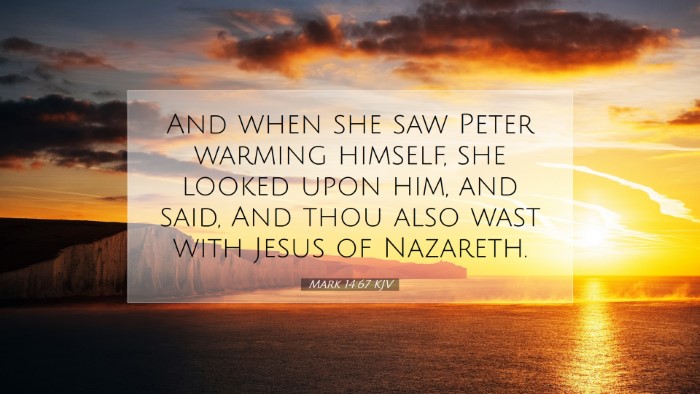Commentary on Mark 14:67
Mark 14:67 records a pivotal moment during the trial of Jesus, where Peter, the disciple, is confronted about his association with the Lord. The verse reads, "And when she saw Peter warming himself, she looked upon him, and said, Thou also wast with Jesus of Nazareth." This moment is loaded with dramatic irony and signifies both a test of faith and a foreboding of challenges faced by believers.
Contextual Analysis
Understanding the surrounding context of this passage is essential. This encounter occurs in the courtyard of the high priest during Jesus' arrest and impending trial, making it a time charged with fear and uncertainty among Jesus' followers. The juxtaposition of Peter warming himself while his master faces imminent death reflects a tension between safety and discipleship.
The Significance of the Encounter
-
Public Disclosure: The servant girl’s statement not only identifies Peter but also brings public attention to his relationship with Jesus. As noted by Albert Barnes, this acknowledgment in a hostile environment underscores the risk Peter faces in openly declaring his allegiance.
-
Fear and Failure: Peter’s response to this identification is critical. Although not recorded in this verse, we learn from subsequent verses that Peter denies knowing Jesus, highlighting the fragility of human resolve in times of crisis. Matthew Henry expounds on this theme of fear leading to failure, as Peter, previously bold, succumbs to intimidation.
-
Contrast with Earlier Boldness: Earlier in the Gospels, Peter confidently asserted his loyalty to Jesus by proclaiming, “Though all men shall be offended because of thee, yet will I never be offended” (Matthew 26:33). The contrast between past bravado and present cowardice illustrates the theme of vulnerability in human nature.
Theological Reflections
The theological implications of Peter’s denial open up discussions regarding human weakness, the nature of faith, and divine forgiveness. Adam Clarke suggests that this moment foreshadows the grace that will be offered later, once Peter repents and is restored in John 21. This foreshadowing of grace emphasizes God’s ongoing work in the lives of His followers despite their shortcomings.
The Nature of Discipleship
-
Public Discipleship: Discipleship is not merely a private affair but is meant to be visible. Peter’s fear reflects a deeper challenge faced by many believers when their faith is put to the test in public settings. The courage to affirm one's faith is essential, as highlighted by Albert Barnes, who emphasizes that genuine faith must be courageous in the face of opposition.
-
Repentance and Restoration: The beauty of this narrative lies not only in the denial but in Peter’s later restoration. This passage serves as an encouragement to those who struggle with faith and courage, suggesting that failure can lead to deeper reliance on grace and renewed purpose.
Practical Applications
For pastors, students, and theologians, this verse challenges believers to reflect on their own responses to identification with Christ. How readily do they confess their relationship with Jesus in various contexts? There are several practical applications that arise from this moment:
-
Courage in Witness: Believers are called to be bold in their witness, even in adversarial circumstances. This passage serves as a reminder of the importance of standing firm in faith and being ready to declare one’s beliefs publicly.
-
Embracing Weakness: Understanding that weakness is part of the human condition can assist in fostering a community of grace where confession and accountability are paramount. This aligns with Matthew Henry's insights that even the strongest can fall, and thus, mutual support is vital.
-
Restoration after Failure: The narrative of Peter encourages a culture of repentance and reconciliation. As believers recognize their failures, they can embrace the truth that restoration is always possible through Christ’s grace.
Conclusion
Mark 14:67 serves as a profound reminder of the complexities involved in discipleship. Through Peter’s encounter, we learn about the challenges of maintaining loyalty to Christ amidst fear and societal pressure. Yet, through the lens of grace that follows, the passage assures believers of their identity in Christ despite their failures and encourages them towards courageous and public declarations of faith. As we engage with this text, let it provoke us toward a deeper understanding of our weaknesses while celebrating the unfathomable depth of God's grace.


